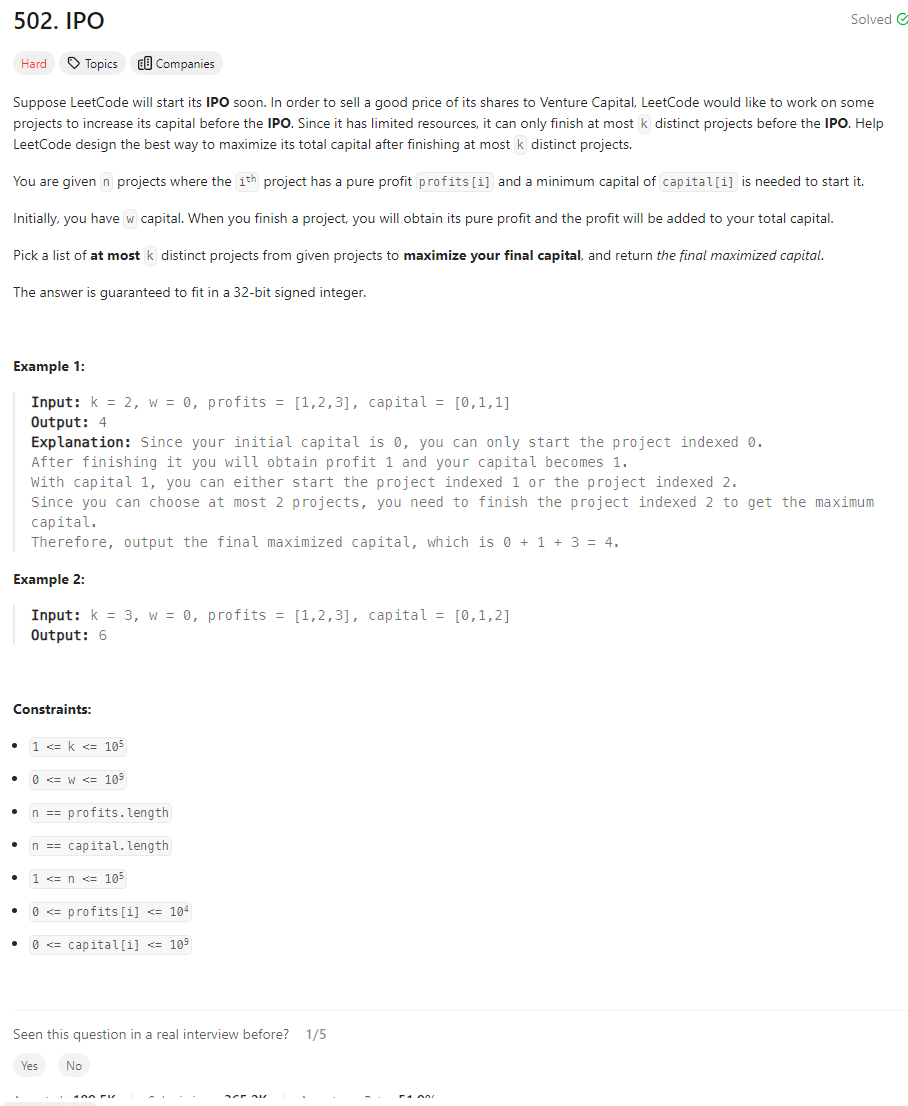Problem of The Day: IPO
Problem Statement

Heap Approach - TLE
class Solution:
def findMaximizedCapital(self, k: int, w: int, profits: List[int], capital: List[int]) -> int:
max_capital = w
max_heap = []
for p, c in zip(profits, capital):
heapq.heappush(max_heap, [p * -1, c])
while k > 0:
max_profit = 0
temp = []
while max_heap:
p, c = heapq.heappop(max_heap)
if c <= max_capital:
max_profit = p*-1
break
temp.append([p, c])
while temp:
heapq.heappush(max_heap, temp.pop())
max_capital += max_profit
k -= 1
return max_capital
Intuition
The goal is to maximize the capital after completing at most k projects. Each project has a required capital to start and provides a certain profit. The idea is to prioritize projects with the highest profit that can be started with the current available capital.
Approach
- Use Heaps:
- Min-Heap: To keep track of projects sorted by their capital requirements. This allows us to efficiently find all projects that can be started with the current capital.
- Max-Heap: To keep track of available projects by their profit in descending order. This ensures that we always select the most profitable project available.
- Populate the Min-Heap: Push all projects into the min-heap based on their capital requirements.
- Iterate up to
ktimes:- Move all projects that can be started with the current capital from the min-heap to the max-heap.
- If no projects are available to start, break early.
- Otherwise, start the most profitable project (pop from the max-heap) and increase the current capital by the profit of that project.
- Return the final capital after completing up to
kprojects.
Complexity
- Time Complexity: (O(n \log n + k \log n))
- (O(n \log n)) to push all
nprojects into the min-heap. - For each of the
kiterations, moving projects from the min-heap to the max-heap and then popping the most profitable project takes (O(\log n)).
- (O(n \log n)) to push all
- Space Complexity: (O(n))
- The space required to store the
nprojects in the heaps.
- The space required to store the
Code
class Solution:
def findMaximizedCapital(self, k: int, w: int, profits: List[int], capital: List[int]) -> int:
min_heap = []
max_heap = []
# Populate the min_heap with projects by their capital requirements
for c, p in zip(capital, profits):
heapq.heappush(min_heap, (c, p))
# Iterate k times or until there are no more projects we can start
for _ in range(k):
# Move all projects that can be started with the current capital to the max_heap
while min_heap and min_heap[0][0] <= w:
c, p = heapq.heappop(min_heap)
heapq.heappush(max_heap, -p)
# If there are no projects that can be started, break early
if not max_heap:
break
# Start the project with the highest profit
w -= heapq.heappop(max_heap)
return w
Editorial
Using only one heap.
class Solution:
def findMaximizedCapital(self, k: int, w: int, profits: List[int],
capital: List[int]) -> int:
n = len(profits)
projects = list(zip(capital, profits))
projects.sort()
# heapq is a min heap, but we need a max heap
# so we will store negated elements
q = []
ptr = 0
for i in range(k):
while ptr < n and projects[ptr][0] <= w:
# push a negated element
heappush(q, -projects[ptr][1])
ptr += 1
if not q:
break
# pop a negated element
w += -heappop(q)
return w
- time: O(n log n)
- space: O(n)